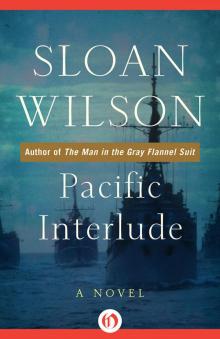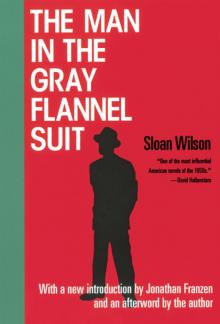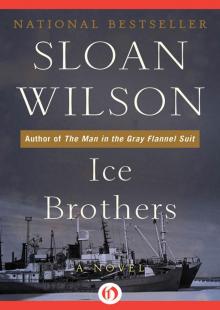- Home
- Sloan Wilson
A Summer Place Page 19
A Summer Place Read online
Page 19
None of the boys said anything. “Poor Bill was probably having trouble at home, and felt he had to get there quickly,” Mr. Caulfield said.
Still no one said anything. “It is a tragic accident,” Mr. Caulfield said. “A fine boy is
dead, and we must all respect his memory.”
“Yes suh,” Dick Woller said. His lip trembled.
“I appreciate the maturity with which you’re all acting,” Mr. Caulfield said more briskly. “Classes will of course be held as usual, but anyone who wishes may join the football game out at the gym, and there will be a special movie tonight.”
He hesitated, and for a moment he looked confused. “Boys,” he said, “things like this happen sometimes in life, and no one can be blamed. We have to trust in God, I guess. Run along now, and try not to dwell on it too much.” He sank wearily into his chair.
The boys filed silently out and joined the others in the quadrangle.
“Where did it happen?” a thin boy asked.
“Outside Draytown,” someone said.
A crowd of boys gathered around. “Mr. Nealy sure took it hard,” a fat one said. “He’s gone to the hospital. An ambulance came in the back way and got him.”
“I thought he was dead,” a tall thin boy said.
“Bill is. I’m talking about Mr. Nealy.”
“Ted Whitely heard on the radio that the car was completely demolished,” a solemn child about thirteen years old with the puffed-out cheeks and mild blue eyes of a cherub said. “It burned him up.”
John turned away, nauseated. He walked across the muddy quadrangle into the woods, and leaning against the cold bark of an oak, vomited. Then he started to walk slowly through the woods, aimlessly, his tracks circling widely and crossing, twisting back again, forming a pattern of agony and confusion in the mud.
Exhausted, he finally returned to the school. A police car was parked by Mr. Caulfield’s office, and a master was shooing the boys away from that part of the quadrangle. John headed for the dining hall and sat there without eating.
Later that afternoon he went to his room. Bill’s bed, with a new counterpane, was neatly made up, and looked shockingly empty. The silence in the room seemed to hum. John turned to the drawer where Bill kept his collections of photographs, and found it too was empty. John wondered what Mr. Caulfield would think of the collection of faded snapshots of the war, and of the nudes, of the girl with the dark braids leaning against the pillar of the ruin, of her wondrously rich, symmetrical body. Mr. Caulfield would have these things burned, probably. Everything, even Bill’s clothes were gone, and the room was lonely as a tomb.
Three days afterward Mr. Caulfield told John that Bill Norris’ mother would like to talk to him. “You realize, of course, that we’re in a rather difficult situation,” Mr. Caulfield said. “Bill’s death was an accident, as you know, but the boy was disturbed—there’s no doubt about that. Yet we can’t say that. Mrs. Norris is herself a highly strung person, and we can’t do anything that would hurt her.”
“I’ll try not to,” John said.
Mrs. Norris sat in the living room of Mr. Caulfield’s home, a handsome brick house at the north end of the campus, where a formal tea was held for the students once a month to give the students a little home atmosphere. She was a thin woman who looked shockingly like her son done up for a costume ball, with long hair and a black dress. She leaned forward on the reproduction of a Hitchcock chair, with her hands clasped tightly in her lap. “So you’re Bill’s roommate,” she said. “He wrote so happily about you.”
“I liked Bill very much,” John said.
“I don’t want to make things difficult for you,” Mrs. Norris continued. “I know this is a hard thing for a young boy. It must be almost as hard on you as it is on me.”
Mr. Caulfield, sitting in a gold upholstered easy chair, cleared his throat. John stood in the center of the floor. He was too nervous to sit down.
“Still,” Mrs. Norris said, “there are some things I do hope you’ll tell me, which I’m sure you’ll understand I have to know.”
“Yes,” John said.
“Do you know where Bill was going when he left here, and why he stole a car?” John stared at his feet.
“I think he did it on a dare,” Mr. Caulfield said. “He was always such a venturesome boy. Some of the others may have dared him to take the car, and of course he didn’t really know how to drive…”
“That’s what I think,” John heard himself saying. “It must have been a dare.”
Mrs. Norris sighed. “It’s strange,” she said. “He always seemed to me to be such a timid child…”
“I think we ought to have a glass of sherry,” Mr. Caulfield said gravely.
Colchester Academy used sherry the way the British Navy uses rum. John never liked it much, but that day he sat sipping it, trying to think of nice things to say about Bill to his mother. “He was liked by everyone,” he heard himself saying. “He was one of the most popular boys in school.”
Fifteen minutes later Mr. Caulfield accompanied John to the door and squeezed his elbow approvingly while saying goodbye. John felt obscurely venal, but what truth could he have told Bill’s mother? How could he have explained the things that had happened, and who, after all, knew why?
Chapter Nineteen
THE NEGOTIATIONS for the divorce dragged on, and Sylvia and Ken did not realize their hopes of getting married quickly. Sylvia remained in Florida throughout that summer of 1954, walking on the beach with Carla, seeking shells. Ken made many trips to New York, where Bernie Anderson had moved to start their new business. Helen would not let him see Molly, at least until everything was settled, because it upset the poor child too much, she said. Ken wrote Molly once a week, and often sent her little gifts: a pair of white angora mittens which were certainly out of season, but which somehow reminded him of her; a necklace of cultured pearls, and a light gray, rather adult hat with a cocky little feather which he saw in a store window and thought would look nice on her. In return he got short notes which in rather stilted phrases expressed gratitude for the gifts and nothing else.
The year 1954 was hard for everyone concerned. John refused to go to summer camp and stayed with his father on Pine Island. Barton wrote Helen, inviting her and Molly to pay them a visit, but he got a polite refusal. Molly hadn’t been awfully well lately, Helen wrote, and they were going to keep her home.
There were no young people his age on the island that year, and for the first week of his summer vacation John wandered by himself over every inch of the place, exploring the highest mountains, the deep ravines and the most deserted sections of the beach. During the evenings he sat in a dim corner of the inn playing the old piano, teaching himself new songs, but the piano was badly out of tune and it would cost a great deal to have a man come from the mainland to fix it. At the end of a week, John told his father it was stupid to waste time, and he wanted to work.
“At what?” Bart asked.
The wharf was badly rotted, John pointed out, and the gardens needed a great deal of attention. “I could trim bushes if Todd would show me how,” he said. “The wharf is a much bigger job.”
Hasper had had arthritis badly that winter, and his hands were gnarled as the limbs of old trees. Glowering silently, he gave John a lesson in pruning, and John got to work. His ambition was to put the whole garden in shape, which was impossible for even a grown man to do in one summer, but, he worked feverishly, often arising at dawn and continuing until dark. Although he was not yet sixteen, the muscles of his back and shoulders were beginning to develop like those of a professional athlete.
Bart fell off the wagon frequently that year. He had trouble getting women from Harvesport to stay as housekeepers at the inn, but only a dozen old ladies requested reservations, and there wasn’t much which Lillian, the cook, couldn’t handle by herself. On warm summer evenings Bart often stood talking to John while the boy was working. They made an odd sight
together. John, wearing only a pair of soiled khaki trousers, wielded the big pruning shears without comment during most of the conversations, while Bart, dressed in a white linen suit, followed him from bush to bush, glass in hand.
What Bart talked about most of the time was the war, and the part he had played in it; he had a compulsion to make his son understand this; it seemed extremely important that he know, and Bart talked about it almost incessantly, repeating himself over and over again not only through drunken forgetfulness, but because he was nagged by the feeling that John didn’t fully understand. By the end of summer the story was so deeply ingrained in John’s mind that it was almost as much a part of the boy’s personal experience as his father’s.
The story began when Bart joined the Naval Reserve at college in the belief that it might increase his skills as a yachtsman. “Naval Science,” as it was called at Harvard, was his only good subject, and when the war broke out, he was able to get an ensign’s commission in spite of the fact that he had never graduated. In January of 1942, he was called to active duty and stationed aboard an old four-stack destroyer which was escorting ships to England.
As soon as the ship left Boston Harbor, Bart was, to his great astonishment, hopelessly seasick. All his life he had sailed boats, but the destroyer racing at twenty knots through the winter seas was something entirely different. The convoy she was escorting had to zigzag, and the destroyer had to patrol around the basic zigzag pattern. She was changing course constantly, first rolling forty-five degrees, then pitching her bow under green water up to the five-inch gun. The men aboard her were shaken like dried peas in a rattle.
But although he was sick, Bart never missed a watch. Often he stood on the wing of the bridge with a bucket hooked over his left arm. He lost twenty pounds and got so weak he had to hang onto a stanchion with both arms, sometimes, just to keep upright, but he braved it out, and after a month the seasickness diminished. Within two months he was allowed to stand a deck watch by himself.
The most junior officer was usually given the graveyard watch, as it was called, lasting from midnight to four in the morning. In March of 1942, on only the third night that he had stood his own watch, a heavy gale was blowing. The convoy consisted of a dozen naval tankers taking gasoline to bases in Britain. Heavy-laden, they were smothered in foam by the Arctic combers, and the convoy speed had to be reduced to four knots. There were no moon and no stars that night, and Bart’s ship had not yet been given radar. Depending on eyesight and echo sounding devices alone, Bart’s destroyer and three others tried to keep close to the unlighted vessels without running into them. It was bitter cold, with the spray freezing on deck and on the portholes of the pilothouse. On the port wing of the bridge Bart huddled against the wind, staring with binoculars into the rush of blackness.
It was eighteen minutes after two in the morning when a star shell suddenly burst over the convoy, turning the raging sea white. A wolf pack of five black submarines, almost invisible in the night, came charging arrogantly in on the surface with their deck guns stabbing the fat-bellied tankers. It hadn’t been necessary for the submarines to send up another star shell, for in the few seconds that the first one hung blazing in the sky, a gas tanker exploded, sending a column of fire a thousand feet in the air.
Bart rang up general quarters, and before his commanding officer came on deck, changed course to race in the direction of one blurred shape, which he dimly saw through his binoculars. The submarines seemed to be all around them, lying low in the water just beyond the circle of fire made by the tanker, which burned fast. The convoy broke formation and scattered in many directions. The big tankers lumbered along like panicked cows in the night, while the lean destroyers knifed in and out of their ranks, but in the blackness it was almost impossible to tell friend from foe. The shadowy shape toward which Bart had altered course was still indistinct when the captain got to the bridge; it was low in the water, almost awash, and while they stared at it through their binoculars, there was a flash of a gun on the forward deck.
“Open fire,” Bart’s captain said, and it was fortunate that the destroyer had a green crew; fortunate that the seas were so rough that accuracy was impossible; fortunate that most of the first barrage missed, for when one shell hit that indistinct shape it blossomed in fire and became not a submarine but a tanker.
The gun crews aboard the destroyer realized this even before the order to cease fire came from the bridge; it became apparent instantaneously to everyone on deck, and a deathly, sickened silence reigned aboard the ship. Astern of them another tanker, hit by a submarine, exploded, spilling yellow fire over the sea. Oh, there was oil on troubled waters that night, Bart said. The gasoline blazed for many miles around when eight of those tankers went down together, and there was oil on troubled waters indeed.
Bart’s destroyer wheeled, and at full speed charged right through the blazing sea. It was possible to see now, oh it was possible to see quite clearly, Bart told his son. Exposed in the glare of the destruction they had created, the five submarines lay naked in the night, long, black and obscene, with the seas breaking almost over their deck guns. At point-blank range the three destroyers opened up with everything they had, the bull-throated five-inchers, the sharp-cracking three-inchers, the chattering machine guns of many different calibers—all these exploded in crescendos of fury, and they sank three of those submarines before they had a chance to submerge. Afterward the destroyers prowled the burning seas, searching for the other two. One of the submerged submarines doubled back and lay under the burning oil spilling from a tanker, for that is where Bart’s destroyer followed its echo. The ping of the echo-ranging gear came through the machines on the bridge of the destroyer quite clearly, and the man with the headphones on Bart’s ship chanted in a deep Southern accent, “Bearing zero two one, range two thousand yards and closing rapidly; bearing zero two five, range fifteen hundred yards; bearing zero three zero, range one thousand yards; bearing zero three five, range…”
Bart stood on the wing of the bridge while all around the waters blazed. There was a series of short sharp barks as the K-guns of the destroyer tossed the heavy depth charges out on both sides. More depth charges rolled over her stern, and suddenly the burning sea exploded. Geysers of fire shot into the night; the ocean boiled as the deep-set charges went off, and in the midst of all this more oil from the wounded submarine floated to the surface and ignited.
That is what happened, or that, at least, is what Bart told his son on the warm summer evenings in their garden, and John listened understandingly, it seemed, or at least half-understandingly, although most of the time the only sound from him while his father talked was the steady clip, clip, clip of the pruning shears.
The other destroyers went looking for the surviving tankers, which had scattered over the horizon, and Bart’s ship returned to the one tanker that was left burning, the one she herself had hit. Smoke was still pouring from her pilothouse and bridge, while on her rolling deck her crew scrambled back and forth, seeming to be dragged by the serpentine hoses rather than dragging them. The destroyer blinked her signal light at her, and from the bow of the tanker the tiny pinprick of a flashlight answered. The lights talked for ten minutes, after which it was clear that it seemed possible to bring the fire under control, although there was still great danger, because the ship was loaded with gasoline and might explode at any minute. All the officers were dead except the engineering officer, for the shell had hit the bridge. The crew was exhausted from fighting the fire.
Bart was standing beside his commanding officer when the signalman gave this information. “Sir,” Bart said, “let me take a boat over.”
“Too risky,” the captain replied; that’s what he really said; the captain thought it much too risky, Bart told his son.
But Bart insisted, and a boat with fifteen volunteers was swung over the side of the destroyer. Bart, who had always been good at sailing small boats, stood at the helm.
Lowering a boat
at sea is a precarious business, John learned from his father. The ship rolls the boat into the water at one moment, and before the blocks and tackle can be disengaged, lifts it fifty feet into the air the next. Oh, it is a fine art to lower a boat in a raging sea, and a finer art to pull away from the ship before being hurled against her topsides and smashed.
But that night Bart did it perfectly; his timing was exact, and suddenly the boat was free of its murderous mother ship. With the men straining at the oars, the boat sank into a great valley between two mountains of water, while the destroyer shot up to the peaks overhead, and then the boat shot up and the destroyer slid into the valley. But by that time they were a hundred yards apart, with the men grunting at the oars to make the distance grow, and the destroyer’s engines whining in reverse, as she tried to wrench herself away.
They pulled into the darkness and great skill was needed to keep the boat from capsizing. Ahead of them a small bloom of fire still glowed rose red in the middle of the heavy smoke pouring from the tanker’s bridge. Coming alongside the ship was just as precarious as leaving the destroyer; it was the same operation in reverse, but again Bart judged it right, and the tanker’s men, almost collapsing in exhaustion, cheered.
Bart began to help fight the fire aboard the tanker. Trying to forget the great pool of gasoline under the hot decks beneath his feet, he led a crew of men with hoses to the very base of the flames. The engineering officer, a huge man with a bulging paunch hanging out over his belt, led another group, and within an hour they got the fire out. After examining the damage, they decided they could limp into port unaided, steering from the stern with a jury rig.
The destroyer left them; far to the north the remnants of the convoy needed her help. An escort vessel could not be spared for one wounded tanker, not in the winter of 1942. As the destroyer sped into the darkness, her captain, who had never been friendly with Bart before, signaled with a small red blinker light which could be seen for only a very short distance, a message which Bart never forgot: “Well done, and good luck.”

 A Summer Place
A Summer Place Pacific Interlude
Pacific Interlude Man in the Gray Flannel Suit
Man in the Gray Flannel Suit Ice Brothers
Ice Brothers